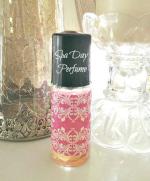Free access to my Ten Best Ever DIY Essential Oil Recipes Guide PLUS the latest essential oil tips & exclusive offers!
What are the key characteristics and properties of natural tea tree oil that make it a popular choice in skincare and haircare products?
by Michelle
(USA)
Natural tea tree oil, derived from the leaves of the Melaleuca alternifolia plant, has gained immense popularity for its numerous health and beauty benefits. With its distinct aroma and potent properties, tea tree oil has become a staple in many households.
Imagine standing amidst a lush forest, surrounded by towering tea tree plants. The air is filled with a refreshing scent, reminiscent of eucalyptus and camphor. As you approach one of the trees, you notice the delicate leaves, slender and vibrant green, glistening with droplets of essential oil.
Close your eyes and envision the process of extracting this precious oil. Picture the skilled hands of experienced harvesters carefully plucking the leaves, ensuring only the finest specimens are chosen. These leaves are then transported to a distillery, where they undergo a meticulous steam distillation process. The steam gently coaxes out the essence of the tea tree, capturing its therapeutic qualities.
Now, let's explore the characteristics of this remarkable oil. Imagine holding a small vial of tea tree oil in your hand. Observe its pale yellow color, clear and pure. As you open the bottle, a powerful aroma fills the air, evoking a sense of cleanliness and freshness. The scent is both invigorating and soothing, with hints of earthiness and herbal notes.
Consider the versatility of tea tree oil. It possesses natural antibacterial, antifungal, and antiseptic properties, making it an excellent remedy for various skin conditions. Visualize applying a few drops of tea tree oil onto your skin, feeling its coolness and gentle tingling sensation as it absorbs. Notice how it helps soothe irritated skin, reduce redness, and promote a healthy complexion.
Think about the potential applications of tea tree oil. From skincare to haircare, it can be found in a wide range of products. Envision using tea tree oil-infused shampoo, feeling its invigorating effect on your scalp, and experiencing the lustrous shine it imparts to your hair.
In conclusion, tea tree oil is a natural wonder, capturing the essence of nature's healing power. Its captivating aroma, therapeutic properties, and versatility make it a cherished ingredient in various products. Close your eyes and let the image of tea tree oil transport you to a world of wellness and beauty.
Q1. What are the key characteristics and properties of natural tea tree oil that make it a popular choice in skincare and haircare products?
A1. Natural tea tree oil is known for its antibacterial, antifungal, and anti-inflammatory properties, making it effective in treating acne, dandruff, and various skin and scalp conditions.
Q2. How does the extraction process of tea tree oil from the Melaleuca alternifolia plant contribute to its purity and potency?
A2. Tea tree oil is extracted through steam distillation, which helps retain the oil's natural compounds and therapeutic properties, ensuring its purity and potency.
Q3. What are the primary therapeutic benefits associated with using natural tea tree oil, and how does it compare to synthetic alternatives?
A3. Natural tea tree oil has been found to have antimicrobial, antiseptic, and soothing properties, making it beneficial for treating skin infections, wounds, and inflammation. Compared to synthetic alternatives, natural tea tree oil is often preferred due to its fewer side effects and more holistic approach.
Q4. In what ways can natural tea tree oil be effectively used to address common skin conditions such as acne, eczema, and fungal infections?
A4. Natural tea tree oil can be applied topically to affected areas to help reduce inflammation, kill bacteria or fungi causing the condition, and promote healing and soothing of the skin.
Q5. How does the distinct aroma of tea tree oil contribute to its overall appeal and effectiveness in aromatherapy practices?
A5. The unique aroma of tea tree oil is often described as fresh, medicinal, and herbaceous. This aroma is believed to have a calming effect on the mind and body, making it popular in aromatherapy for promoting relaxation and relieving stress.
Q6. What precautions should individuals take when using natural tea tree oil topically, particularly in terms of dilution and potential skin sensitivities?
A6. Tea tree oil should be diluted with a carrier oil before applying it to the skin to avoid irritation or allergic reactions. A patch test is recommended to check for any sensitivity or adverse reactions prior to widespread use.
Q7. Can natural tea tree oil be safely ingested or used internally for its potential health benefits, and if so, what are the recommended guidelines for consumption?
A7. It is generally not recommended to ingest tea tree oil as it can be toxic when consumed orally. It is primarily intended for external use only. If considering internal use, it is important to consult with a healthcare professional for guidance.
Comments for What are the key characteristics and properties of natural tea tree oil that make it a popular choice in skincare and haircare products?
|
||
|
||




